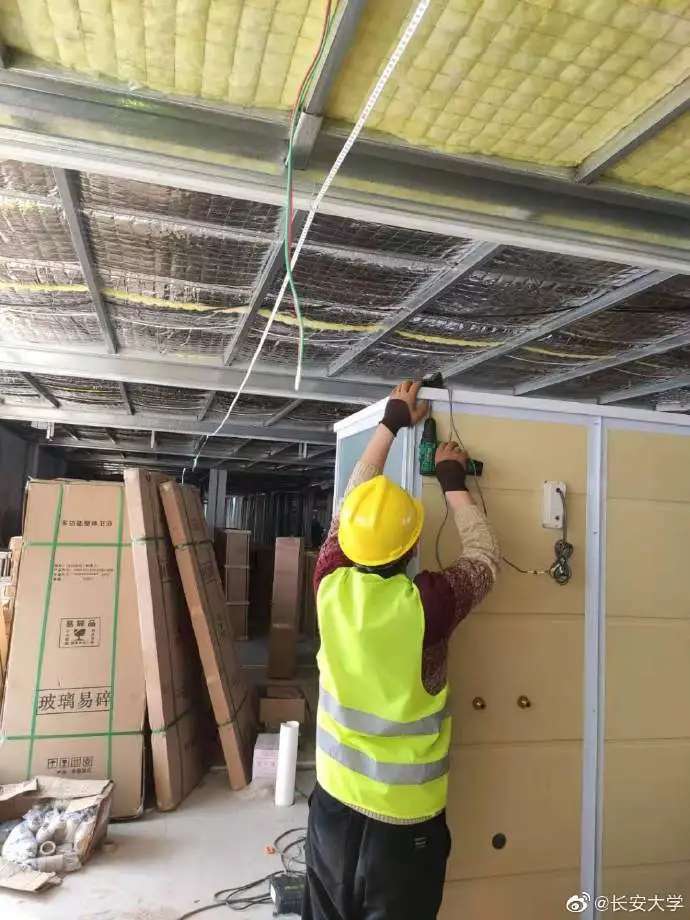

Many post-2000s young Chinese have joined the county’s nationwide efforts to fight the novel coronavirus epidemic, playing active roles in various fields of the battle, the WeChat account of China Youth Daily (ID: zqbycol) reported Monday.

Han Weimin at the construction site.
Han Weimin, a student at the College of Materials Science and Engineering, Jilin University, is one of the many young Chinese born after 2000 who have contributed to the country’s achievements in fighting the epidemic.
On Jan.31, Han’s father received an order from his employer to go to Wuhan, the epicenter of the outbreak, to help with the construction of the Huoshenshan Hospital and Leishenshan Hospital, two makeshift hospitals built for treating patients infected with the novel coronavirus in the city.
“I’m a college student. I want to go there and contribute to the fight against the epidemic too,” Han said immediately after he heard the news.
As the decision to help at the construction site not only involved heavy tasks, tight schedules, and physical labour that was too much for many ordinary people, but also the risk of infection, Han’s father didn’t want to take him to Wuhan until he repeatedly insisted on taking part in the work.
Han was in charge of the installation of the water supply pipelines in the medical staff quarters at the Leishenshan Hospital, which followed a strict schedule.
The work was intense, and he only got to sleep five to six hours a day, and was hard at work the rest of the time, according to Han, who finally got through the job because of his determination.
“I got so much out of taking part in the project. I felt the solidarity and resolve of construction workers from around the country in the race against time and the fight against the epidemic. We have successfully accomplished this sacred mission given to us by our country and people,” Han said.
“I wasn’t involved in the construction for a very long time, but this will be the most unforgettable experience of my life. As a student of Jilin University in the new era, I feel so honored to have been able to contribute to the epidemic prevention and control,” Han added.

Xu Zhuoli at work
Xu Zhuoli, a 19-year-old student at the school of civil engineering, Chang’an University, also took part in the construction of the Leishenshan Hospital.
Xu, a young man from Hanchuan, central China’s Hubei province, arrived at the construction site of the hospital on the evening of Feb. 2 and joined the team that was in charge of equipment installation there.
Xu was overwhelmed by his first job, which was to carry with his bare hands a total of 169 pieces of cargo to the construction site with 19 other workers.
It was only after completing the task through strong will and persistence that Xu truly realized how laborious working on a construction site was.
Xu often worked all night on the project. In the mind of this young man, who wanted to play his part in his hometown’s efforts to fight the epidemic, he was not only one of the people in the country who rose to the challenge posed by the epidemic, but also one of the men who built Leishenshan Hospital.
“I believe winter will pass and spring will arrive,” Xu said firmly.
On Jan. 28, the bureau of transport of Pengjiang district, Jiangmen, south China’s Guangdong province, received a special written request for an assignment.
The request was from five college students from different universities around the country. Zhong Yue, a freshman from the School of Arts and Design, Zhuhai College of Jilin University, was the youngest of the five students.

Zhong Yue (2nd from right)
“We had been volunteers helping at the transport bureau during the Spring Festival travel rush since Jan. 10. After the outbreak of the epidemic, we were asked to rest for a few days for our own safety,” explained Zhong.
“Seeing that the bureau was undermanned, we wanted to help. So we wrote our request and submitted it on Jan. 28, when we started to play a part in the epidemic prevention and control efforts,” Zhong said.
Zhong was part of the team on the front line of the battle that registered basic information of travellers at various passenger stations as well as exits and entrances of highways.
“I think voluntary work in school and outside campus is similar, as no matter what I do, I get a lot of positive energy from my coworkers. They make me feel the value of teamwork,” Zhong said.
“I was not a cautious person before. But after my experience taking part in the epidemic prevention and control this time, I became careful and learned to take precautions,” Zhong noted.
“My parents are also among the medical workers and people fighting the epidemic on the frontline. When I told them my idea of taking part in the transport bureau’s epidemic prevention and control efforts, my father supported me, but my mother was worried about me,” Zhong disclosed.
“I had fears, for sure, as people had died. But I feel honored to have contributed to the prevention and control of the epidemic,” Zhong added.
“I checked the news about the epidemic situation online every day. As a college student, I’ve always thought about what I can do for our country when it is in difficulty,” said Gan Zhiyi, a student at the Hunan Vocational Institute of Safety Technology, who donated 10,000 yuan ($1,425.86), which was all his Spring Festival “lucky money”, to a charity in Kaifu district, Changsha, capital of central China’s Hunan province on Jan. 31.
“It was not until I made the donation that I told my family I had donated all my lucky money that I’d saved up to charity. All my family members supported my decision,” Gan said.
“Medical workers and grassroots staff at various organizations are working extra hours at their posts,” said Gan, who explained that as a college student, besides staying at home and not adding to the country’s problems, the only thing he can do is to donate money, which was his way of helping with the prevention and control of the epidemic.
Such stories of post-2000s youngsters making contributions to China’s efforts to fight the novel coronavirus go on and on.
 Fire brigade in Shanghai holds group wedding
Fire brigade in Shanghai holds group wedding Tourists enjoy ice sculptures in Datan Town, north China
Tourists enjoy ice sculptures in Datan Town, north China Sunset scenery of Dayan Pagoda in Xi'an
Sunset scenery of Dayan Pagoda in Xi'an Tourists have fun at scenic spot in Nanlong Town, NW China
Tourists have fun at scenic spot in Nanlong Town, NW China Harbin attracts tourists by making best use of ice in winter
Harbin attracts tourists by making best use of ice in winter In pics: FIS Alpine Ski Women's World Cup Slalom
In pics: FIS Alpine Ski Women's World Cup Slalom Black-necked cranes rest at reservoir in Lhunzhub County, Lhasa
Black-necked cranes rest at reservoir in Lhunzhub County, Lhasa China's FAST telescope will be available to foreign scientists in April
China's FAST telescope will be available to foreign scientists in April "She power" plays indispensable role in poverty alleviation
"She power" plays indispensable role in poverty alleviation Top 10 world news events of People's Daily in 2020
Top 10 world news events of People's Daily in 2020 Top 10 China news events of People's Daily in 2020
Top 10 China news events of People's Daily in 2020 Top 10 media buzzwords of 2020
Top 10 media buzzwords of 2020 Year-ender:10 major tourism stories of 2020
Year-ender:10 major tourism stories of 2020 No interference in Venezuelan issues
No interference in Venezuelan issues
 Biz prepares for trade spat
Biz prepares for trade spat
 Broadcasting Continent
Broadcasting Continent Australia wins Chinese CEOs as US loses
Australia wins Chinese CEOs as US loses